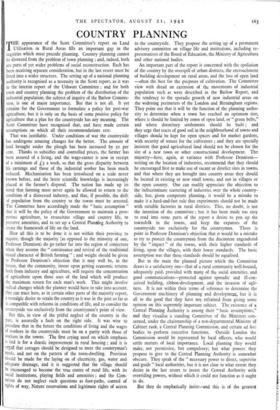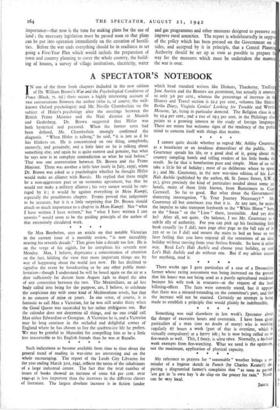COUNTRY PLANNING
J. HE appearance of the Scott Committee's report on Land Utilisation in Rural Areas fills an important gap in the inquiries which must precede planning. Country planning cannot be divorced from the problem of town planning ; and, indeed, both are parts of yet wider problems of social reconstruction. Each has been receiving separate consideration, but in the last resort must be fitted into a wider structure. The setting up of a national planning authority is recognised as a necessity in the Scott report, as it was in the interim report of the Uthwatt Committee ; and for both town and country planning the problem of the distribution of the industrial population, the subject of inquiry of the Barlow Commis- sion, is one of major importance. But that is not all. It yet remains for the Government to formulate a policy for post-war agriculture, but it is only on the basis of some positive policy for agriculture that a plan for the countryside has any meaning. The Scott Committee have recognised that, and have made certain assumptions on which all their recommendations rest.
That was justifiable. Under conditions of war the countryside has undergone amazing changes for the better. The amount of land brought under the plough has been increased by 5o per cent. Thanks to subsidies and controlled prices, the farmer has been assured of a living, and the wage-earner is now in receipt of a minimum of 3 a week, so that the gross disparity between his earnings and those of the industrial worker has been much reduced. Mechanisation has been introduced on a scale never known before, and the latest scientific knowledge is increasingly placed at the farmer's disposal. The nation has made up its mind that farming must never again be allowed to return to the condition of a distressed industry, and that, if possible, the drift of population from the country to the towns must be arrested. The Committee have accordingly made the " basic assumption " that it will be the policy of the Government to maintain a pros- perous agriculture, to resuscitate village and country life, to preserve amenities, and to set up a Central Planning Authority to create the framework of life on the land.
How all this is to be done it is not within their province to Inquire, though the majority (as opposed to the minority of one, Professor Dennison) do go rather far into the region of conjecture when they assume the " continuance and revival of the traditional mixed character of British farming " ; and weight should be given to Professor Dennison's objection that it may well be, in the future, that the community, intent upon getting economic returns both from industry and agriculture, will require the concentration of agriculture upon those uses of the land which will produce the maximum return for each man's work. This might involve radical changes which the planner would have to take into account. One can trace here, as in certain- other parts of the majority report, a nostalgic desire to retain the country as it was in the past so far as is compatible with reforms in conditions of life, and to consider the countryside too exclusively from the countryman's point of view.
But this, in view of the pitiful neglect of the country in the past, is assuredly a fault on the right side. It was wise to postulate that in the future the conditions of living and the wages of workers in the countryside must be on a parity with those of workers in the towns. The first crying need on which emphasis is laid is for a drastic improvement in rural housing ; and it is urged that cottages should be designed to meet the countryman's needs, and not on the pattern of the town-dwelling. Provision should be made for the laying on of electricity, gas, water and adequate drainage, and it is suggested that the village should be encouraged to become the true centre of rural life, with its social institutions, playing fields and amenities ; and the Com- mittee do not neglect such questions as foot-paths, control of rights of way, Nature reservations and legitimate rights of access to the countryside. They propose the setting up of a permanent advisory committee on village life and institutions, including re- presentatives of the Board of Education, the Ministry of Agriculture and other national bodies.
An important part of the report is concerned with the spoliation of the country by the overspill of urban districts, the encroachment of building development on rural areas, and the loss of open land —often the best for the purposes of cultivation. The Committee view with dread an extension of the movements of industrial population such as were described in the Barlow Report, and the tendency to the sporadic growth of new industrial areas on the widening perimeters of the London and Birmingham regions.
They point out that it will be the function of the planning autho- rity to determine when a town has reached an optimum size, where it should be limited by zones of open land, or " green belts," and where dormitory settlements should be built ; and they urge that tracts of good soil in the neighbourhood of towns and villages should be kept for open spaces and for market gardens, with security of tenure for the cultivators ; and they are specially insistent that good agricultural land should not be chosen for the site of a new town or other constructional development. The majority—here, again, at variance with Professor Dennison— writing on the location of industries, recommend that they should be encouraged first to make use of vacant or derelict sites in towns, and that where they are brought into country areas they should be located in existing or new small towns, and not in villages or the open country. One can readily appreciate the objection to the indiscriminate scattering of industries over the whole country- side, but, given competent planning, it would be a mistake to make it a hard-and-fast rule that experiments should not be made with suitable factories in rural districts. This, no doubt, is not the intention of the committee ; but it has been made too easy to read into some parts of the report a desire to pen up the townsfolk in the towns, and keep the expanses of the countryside too exclusively for the countryman. There is point in Professor Dennison's objection that it would be a mistake to try to protect the countryman from the discontent engendered by the " impact " of the towns, with their higher standards of living, upon the villages, with their lower standards. The basic assumption was that these standards should be equalised.
But in the main the planned picture which the Committee draws is a satisfactory one—that of a rural community well-housed, adequately paid, provided with many of the social amenities, and good communications—protected against sporadic and ill-con- ceived building, ribbon-development, and the invasion of ugli- ness. It is not within their terms of reference to determine the Government machinery of planning and development, but it is all to the good that they have not refrained from giving some opinion on this supremely important subject. The existence of a Central Planning Authority is among their " basic assumptions," and they visualise a standing Committee of the Ministers con- cerned, under the chairmanship of a non-departmental Minister of Cabinet rank, a Central Planning Commission, and certain ad hoc bodies. to perform executive functions. Outside London the Commission would be represented by local officers, who would settle matters of local importance. Local planning they would make, not permissive, but compulsory; but what powers they propose to give to the Central Planning Authority is somewhat obscure. They speak of the " necessary power to direct, supervise and guide " local authorities, but it is not clear to what extent they desire in the last resort to invest the Central Authority with overriding powers, without which it could not function as it ought to do.
But they do emphatically insist—and this is of the greatest importance—that now is the time for making plans for the use of land ; the necessary legislation must be passed soon so that plans can be put into operation immediately on the cessation of hostili- ties. Before the war ends everything should be in readiness to set going a Five-Year Plan which would include the preparation of town and country planning to cover the whole country, the build- ing of houses, a survey of village institutions, electricity, water and gas programmes and other measures designed to preserve a improve rural amenities. The report is wholeheartedly in suppo of the policy which has been pressed on the Government on sides, and accepted by it in principle, that a Central Planni Authority should be set up as soon as possible to prepare way for the measures which must be undertaken the mome the war is over.



























 Previous page
Previous page